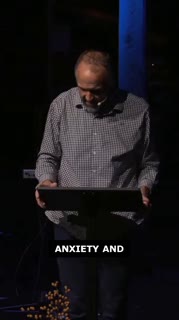Transforming Worry into Trust: Embracing Jesus' Peace
Devotional
Sermon Summary
Bible Study Guide
Sermon Clips
3. "Worry then is an invitation to trust God with the important things of our life. We don't worry about things we don't care about. Like this is the fundamental thing. Worry, every time there's this opportunity to be consumed or to be controlled by worry, really it's an opportunity to trust God with these important things. If you're worried about your kids, it's an opportunity to trust God with them. You're worried about the outcome of a surgery, it's an opportunity to trust God." [00:59:15] (24 seconds)
4. "Anxiety and worry teach us to say, God doesn't love me, God can't love me, God doesn't care for me, He doesn't provide and can't provide. What a thing. What a thing to say. I just stop here, like being able to confess this as your pastor. There have been times in my life, in deep worry and anxiety, I question, does God love me? Will God care for me? Will He provide for me?" [01:00:47] (28 seconds)
6. "Disconnect it for a week. And what I mean is delete the social apps, no work email on your phone, no games on the phone. Disable all non-life-critical notifications on your phone. Right? Your fantasy football league is not life-critical. Like, just not. Your socials are not life-critical. Your work notifications aren't life-critical. They're just not. Don't watch. Don't watch on your phone. Don't watch your phone before you go to bed. Just disconnect." [01:05:44] (27 seconds)
7. "Jesus cares for you. We think about salvation, and it is this beautiful exchange where he dies on the cross, rises from the dead, and he saves us. And there's a real sense, which this becomes so familiar, that we forget that Jesus loves you. Loves us. That he actually cares for us. That his heart is disposed for us. He's concerned for you. He's concerned about you. He sees you. He knows you. He's working." [01:07:21] (31 seconds)
8. "If God clothes the lilies in splendor, he'll care for you. If God keeps the planet spinning, he'll keep caring for you. If God cares for the birds who do nothing but be birds, how much more will he care for you? Cast your worries, your anxieties, and concerns on Jesus. He's better at holding them than you are." [01:13:44] (21 seconds)
9. "In order to not be captured by anxiety and worry or controlled by it, we have to capture it with prayer. This is not new. What I'm offering you today is not new news. Most of us who have been Christians say, yeah, we're supposed to pray our anxiety away or whatever you want to say. Look, in order to not be captured by anxiety or controlled by worry, we have to capture those thoughts in prayer." [01:11:01] (25 seconds)
10. "If I know my Father, I know my Father has good plans, yes, good plans, good plans. He has, He has good plans. He has good plans. It's good news that the death and resurrection of Jesus prove He has good plans. If He can redeem that and make the most evil act in history a product for our freedom, for our hope. You don't have to be worried about your life. You don't have to be controlled by anxiety. The Lord has good plans." [01:33:30] (23 seconds)







